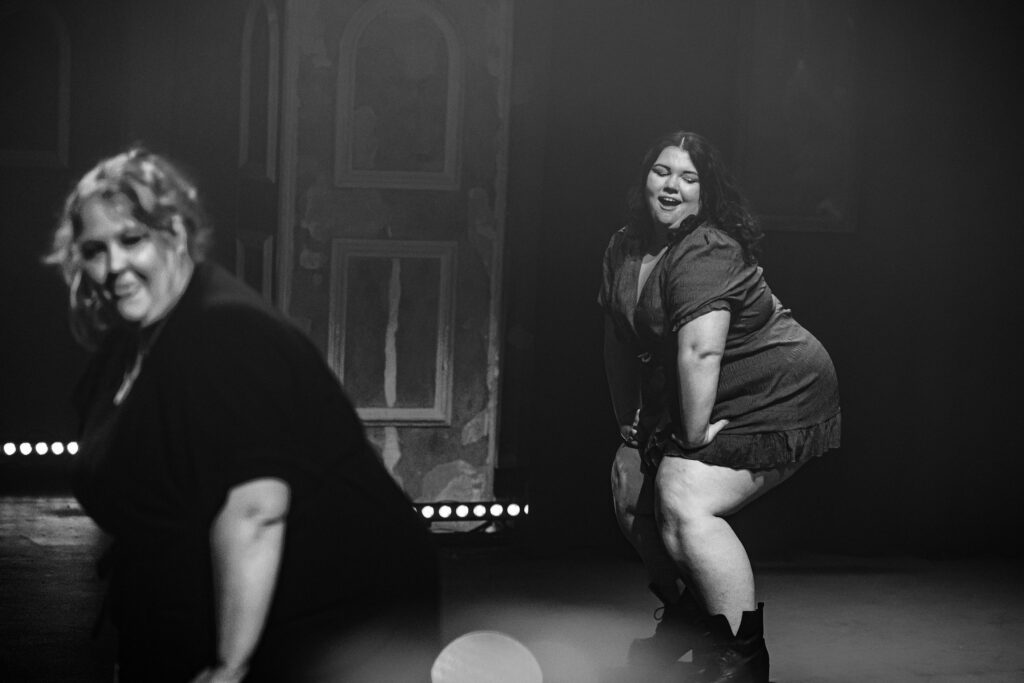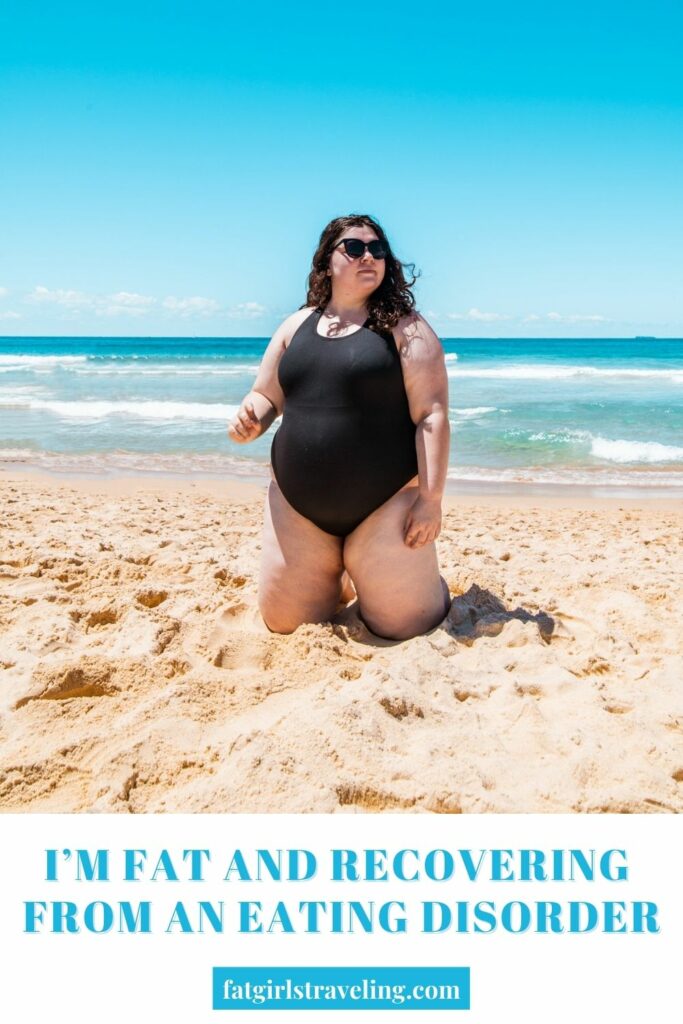It’s so important for us to share stories from our community. Recently Tori shared part of her story in the Facebook Community and explained why certain words and terms can be triggering for those in eating disorder recovery. We reached out to Tori and asked if she was comfortable sharing more as she works towards destigmatizing conversations about eating disorders in the fat community.
Before we dig deep let’s get to know Tori a bit more. She’s a 26-year-old Sagittarius living in Sydney, Australia, and working full time in social media. She’s an avid dancer and traveller, her favorite destination so far is Sweden. Something she always packs is a camera because photography is another passion.
When do you think your disordered eating behavior began?
I’ve always been in a bigger body for as long as I can remember, which has often meant that I have received constant weight loss pressure from society and the people around me. When I was 21, I received a diagnosis of Polycystic Ovarian Syndrome (PCOS) which affects a woman’s hormone levels. PCOS is quite common with 1 in 10 women of childbearing age experiencing it. Often with PCOS, your body struggles to lose weight and easily gains weight, a lot of medical professionals advise that losing weight is the best way to reduce the symptoms of PCOS and in some situations, remove it entirely. So it’s no surprise, that people with PCOS are more likely to have an eating disorder.
After a couple of years of losing weight through excessive dieting and intense cardio, I started regressing as my diet and lifestyle were not sustainable. I moved states, and started seeing a dietitian once again to “get back on track”. After having uncontrollable binges and the lowest self-esteem of my life, I flagged this with her to which she acknowledged that she thinks I could have a Binge Eating Disorder. From there, she referred me to a GP and I was diagnosed and qualified for the Medicare Eating Disorder Care Plan. This involves a lengthy questionnaire asking questions about your eating behaviour, your thoughts on your weight and shape etc. This was in 2020 when the pandemic was really in full swing. It definitely got worse during that time but I believe I have had this for longer than that, I was just too busy with diet culture to ever notice.
Did you receive praise for weight loss?
My whole life! Throughout my eating disorder journey, my weight has gone up and then maintained, so I haven’t had any comments throughout it as I haven’t lost weight. However, I have become more hyper-aware of how much harmful language we use in society from praising weight loss to labelling food good and bad (I still slip up on this one). Don’t even get me started on the term ‘cheat day’.

Did you think you had an eating disorder?
I had no idea whatsoever. If my dietician had not flagged it initially, I would never have pursued the diagnosis. I always thought of eating disorders as anorexia nervosa and bulimia and thought they only affected a stereotypical thin person. Looking back, I was incredibly incorrect and ignorant and have learned so much more since then. I always thought of them as very scary and rare, which I do have bad days, but I am very open about it and my journey as I think it’s important to destigmatise it.
How do you think your eating disorder impacted your mental health?
Often people see eating disorders as just eating behaviours when realistically that’s only one small part of it. A big part of my eating disorder was feeling like I was only ever seen and judged by my weight and shape, being incredibly unhappy with my weight and shape, and feeling so stressed for people to see me. Arguably, the best part of my treatment has been working with a psychologist to understand my thoughts and beliefs about myself and food.
You Might Also Enjoy: Perfection, The Enemy: My PCOS Story
What helped you recognize that you needed help managing your eating disorder?
My dietitian really kicked it all off for me. I do remember being skeptical at first and still to this day, I have weight loss thoughts. It can be challenging to completely be happy with your body in a society that constantly tells you to hate on it. I’m getting better with that but I can’t sit here and say I never have thoughts of weight loss. I’m a huge believer in therapy, so there wasn’t any resistance from my end to seek help and go to treatment.
Was receiving a diagnosis difficult? Eating Disorders are under-diagnosed in fat people.
Getting the diagnosis wasn’t difficult as I was referred to this doctor by my dietitian. However, throughout the treatment has been challenging with this doctor as she is focused on my weight. This has caused a bit of conflict among some of my health team and I’m currently pursuing changing doctors to a Health at Every Size (HAES) doctor.
Are you currently seeking treatment? If so, do you mind sharing?
Yes, I am. In Australia, we have the Eating Disorder Care Plan (EDP) which is under
Medicare (public health provider). This plan can include up to 20 Medicare-subsidised
sessions with a dietitian and 40 sessions with a mental health clinician over a 12-month
period. My health team consists of my GP/Doctor, Psychologist, Dietitian, Exercise
Physiologist, and Psychiatrist. As part of the plan’s rules, you have to see a psychiatrist once
a year to be renewed for another year. Weirdly, exercise physiologists are not included
under the EDP but I have found them to be an integral part of building healthy habits and
changing the role of exercise in my life.
I’ve been in treatment for nearly two years and I can 100% say that it has changed my life. I have a much better relationship with food and exercise. I honestly believe that everyone should have access to the resources included in the EDP. As most people do not have a healthy relationship with food, exercise, and their bodies. Whether that be from lack of education, mental health issues, or the constant pressure of diet culture.

What resources would you suggest to someone who believes they have an eating disorder?
I would recommend that anyone thinking they might have an eating disorder, please see your GP and talk about it. I must admit, there are some GPs who have never heard of the plan I’m on, so it might take some referrals/shopping around. I’ve learned a lot of eating disorder professionals know each other, they’re all in a circle so referrals from my existing health team have been the best way to build up an aligned team.
Something you’ve learned that you wish you knew when you were really struggling?
It’s so important to surround yourself with like-minded people and health professionals. Find health professionals that suit your goals and care about you. I changed my exercise physiologist last year to an amazing EP who actually took the time to get to know my thoughts and opinions around exercise and worked on my mindset with me. This was a game-changer for me. Through that, I also discovered a body-positive anti-diet gym that makes me feel so safe and happy in my body (Haven Wellness in Sydney, Australia). Who is around you and who you’re working with makes the biggest difference.
You Might Also Enjoy: Living with PCOS for 20 Years





